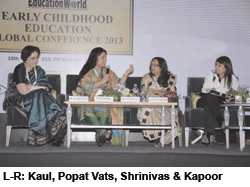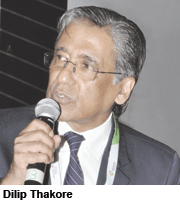Against the backdrop of early childhood education (ECE) being described as an area of darkness in Indian education, at the EducationWorld Early Childhood Education Global Conference 2013, a panel discussion on the subject ‘Is Indian academia/society ignorant about ECE?’, evoked spirited debate.
 Chaired by EducationWorld editor Dilip Thakore (DT), the specially constituted panel comprised Dr. Venita Kaul (VK), director of the School of Education Studies and Center for Early Childhood Education and Development, Ambedkar University, Delhi; Swati Popat Vats (SPV), president of the Podar Education Network and Early Childhood Association (India); Reshma Shrinivas (RS), founder and managing director of WeCare Learning (estb. 2008), Bangalore’s largest wholly owned early childcare and learning centres company; and Suman Kapoor (SK), founder and CEO of Your Kids ‘R’ Our Kids, one of India’s largest corporate childcare chains with 25 centres and an aggregate enrolment of 4,500 children in six cities across India. Excerpts from the 100-minute panel discussion which also provoked much comment from the floor.
Chaired by EducationWorld editor Dilip Thakore (DT), the specially constituted panel comprised Dr. Venita Kaul (VK), director of the School of Education Studies and Center for Early Childhood Education and Development, Ambedkar University, Delhi; Swati Popat Vats (SPV), president of the Podar Education Network and Early Childhood Association (India); Reshma Shrinivas (RS), founder and managing director of WeCare Learning (estb. 2008), Bangalore’s largest wholly owned early childcare and learning centres company; and Suman Kapoor (SK), founder and CEO of Your Kids ‘R’ Our Kids, one of India’s largest corporate childcare chains with 25 centres and an aggregate enrolment of 4,500 children in six cities across India. Excerpts from the 100-minute panel discussion which also provoked much comment from the floor.
DT: Is serious research being conducted on ECE in India’s 611 universities? Why do we always have to rely on research studies done abroad? Also, why haven’t the country’s 1.6 million anganwadis been transformed into preschools?
VK: We tend to become disheartened because we are unaware of the considerable work being done in ECE, possibly because India is vast and information dissemination is abysmal. However, when I visited China recently, I was surprised to discover that it has only recently begun to experiment with ECE, whereas our Integrated Child Development Services (ICDS) programme was started way back in 1975, and our women and child development ministry was the first in South-east Asia to propagate this important initiative. With reference to your question on anganwadis, the answer is the pathetic salaries of anganwadi workers. The total budget per anganwadi is only Rs.1 lakh per year, and with most of it spent on child nutrition, practically nothing is left for education.
DT: Therefore the burden of ECE delivery has devolved on private education providers. Swati, how easy was it to promote the Early Childhood Association (ECA)? What are the objectives of the association?
SPV: There isn’t much enthusiasm for the association because we advocate that preschool teachers should be paid the same salaries as other school teachers, given the equal if not greater, importance of professionally delivered ECE. Our objective is to thoroughly professionalise preschools in India by researching ECE, accrediting preschools, disseminating best practices, and training preschool teachers. We are also ready to provide ECA services to government anganwadis. The Central and state governments are making a big mistake by not cooperating with us.
 DT: Reshma, as a pioneer in delivering on-site early childhood care and education (ECCE) to corporates, how easy was it to sell the idea of childcare centres to Indian industry and parents’ communities?
DT: Reshma, as a pioneer in delivering on-site early childhood care and education (ECCE) to corporates, how easy was it to sell the idea of childcare centres to Indian industry and parents’ communities?
RS: When we started operations five years ago, both communities were receptive from the start. On-site ECCE was welcomed by women in employment and corporates anxious to get trained women back to work. However, the common perception is that care and early childhood education are synonymous. They are not. We need to carefully select and train professionals for both vocations. But obviously selecting and training professional preschool teachers is more difficult.
DT: Suman, you are also providing ECCE services to corporates. Is India Inc enthusiastic about the idea of establishing worksite ECE facilities? How does India’s record in ECE compare with what’s happening in the OECD countries?
SK: Five years ago, corporates were not receptive to the idea of establishing on-site ECCE centres. But now with a large and growing number of highly educated and skilled women in the workforce, larger companies — especially in the IT and ITES industries — are warming to the idea of on-site ECCE centres. A major problem is getting trained teachers. Teacher training colleges pay hardly any attention to developing ECE teachers. Therefore we have to train them ourselves. This is an expensive and time consuming proposition.
DT: Unfortunately, teacher training – especially of ECE teachers — is quite neglected.
VK: Sadly this is true. The B.Ed curriculum has not changed in 30 years. However, I am happy to tell you the National Council for Teacher Education (NCTE) has recently started revising the curriculum.
Delegate from the floor: The problem with ECE in India is that it’s completely unregulated. Therefore the majority of preschools are sub-standard institutions sited in residential flats, gardens and garages offering age-inappropriate education. They need to be regulated.
SPV: Government regulation is a two-sided coin — the minute you bring it in, you open the door to corruption. It may be needed later in ECE, but not at this stage. Instead, self-regulation of private preschools by a members’ association with powers to rate, accredit and expel members is a better solution. We already have a 30-year-old organisation — the Association for Early Childhood Education and Development — with whom ECA can partner to enable self-regulation. This association can provide research, curriculum development and teacher training services. In particular, there’s an urgent need to thoroughly train ECE teachers — a service which ECA already provides.
DT: Teacher training is expensive and drives up the cost of ECE delivery. However people are not ready to pay high tuition fees for ECE.
RS: Unfortunately, even the top corporates want to shrink costs and time while demanding quality. This has impacted every aspect of our lives including education.
DT: On the question of quality, most people want preschools to churn out child geniuses…
SK: Parents and corporate managers need to be educated about the importance of age-appropriate ECE. They tend to regard ECE as early primary rather than preschool education, and pressurise early childhood educators. They want their children to be geniuses, able to write before they can walk!
VK: Such pressure should be resisted by early childhood educators. The RTE Act clearly prohibits entrance exams for preschool and primary children. Therefore parents also need to choose preschools responsibly.
SPV: In ECA, we have resolved to write warning letters to preschool principals who impose entrance and other tests in ECE and primary education which is clearly prohibited under the RTE Act. If they persist, we will name and shame them.
RS: Parents need to know that in ECE, a child’s growth and development is age dependent. So it’s unfair and damaging to small children when parents impose unrealistic expectations upon them in their early years.
SK: We have children as young as six weeks enroled in some of our centres. Even in infancy, their brains are highly active and as educators it is incumbent upon us to ensure we give them age-appropriate stimulation. They need some at home as well.
DT: Quite obviously there’s a consensus within the panel that institutions of higher education — particularly their education faculties — need to research ECE much more intensively and develop age-appropriate and culturally apposite syllabuses for early childhood education. Conterminously the parents’ community also needs to become more aware of the importance and purposes of ECE. Therefore the role of preschool principals and teachers is not only to age-appropriately educate children, but parents as well.
Best of luck!























